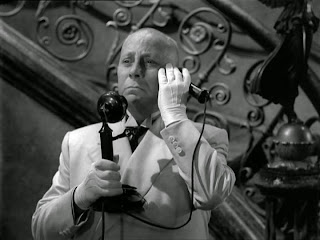And the nominees on the entries from every edition of 1001 Movie You Must See Before You Die are...
Ace in the Hole
A Streetcar Named Desire
Strangers on a Train
The Lavender Hill Mob
Pandora and the Flying Dutchman
The African Queen
Diary of a Country Priest
An American in Paris
A Place in the Sun
The Day the Earth Stood Still
A Streetcar Named Desire
Strangers on a Train
The Lavender Hill Mob
Pandora and the Flying Dutchman
The African Queen
Diary of a Country Priest
An American in Paris
A Place in the Sun
The Day the Earth Stood Still
A Place in the Sun
One of the most famous dramas from the fifties, A Place in the Sun is based on Theodore Dreiser's early twentieth century novel, An American Tragedy. The plot involves poor, but ambitious George Eastman (Montgomery Clift), who works his way up the corporate ladder of his rich relatives business and gets involved with the loving, but simple Alice Tripp (Shelley Winters). He later meets the beautiful Anglea Vickers (Elizabeth Taylor) who he falls for right away. This creates a problem with the lingering presence of Alice, whose relationship with George is further complicated by the fact that she is in a family way...
It sounds like a bit of a soap opera when you try to recount the plot, but it really is a strong drama, with well-cast leads, a tragic story (as the original title indicates) and very solid directorial touches from George Stevens (who won the Academy Award for A Place in the Sun). In fact, the film won the most Academy Awards of any film released in 1951 (6), but lost out to An American in Paris for Best Picture.
It sounds like a bit of a soap opera when you try to recount the plot, but it really is a strong drama, with well-cast leads, a tragic story (as the original title indicates) and very solid directorial touches from George Stevens (who won the Academy Award for A Place in the Sun). In fact, the film won the most Academy Awards of any film released in 1951 (6), but lost out to An American in Paris for Best Picture.
A Place in the Sun
And the Award for Unique and Artistic Picture of 1951 is...Ace in the Hole
Ace in the Hole is probably the most famous Billy Wilder film that I had never seen before starting this blog. It is the story of a little news story about a man trapped in a cave that gets blown up by an opportunistic reporter played by Kirk Douglas. And it is dark. And it is seedy. And it is a movie that is so bleak and has such a dearth of unsympathetic characters, I'm surprised that even a director as respected as Wilder got it made! The alternative title of the film was The Big Carnival, which is what the reporter turns this story into it.
Spike Lee commented that Wilder had a crystal ball peering into the future of modern day news coverage and how things are in today's media. It's easy to imagine the plot of this story being played out today each night on The Nancy Grace Show or on various Internet news outlets. Definitely not a feel good movie, but certainly a good if not great one.
Ace in the Hole
























